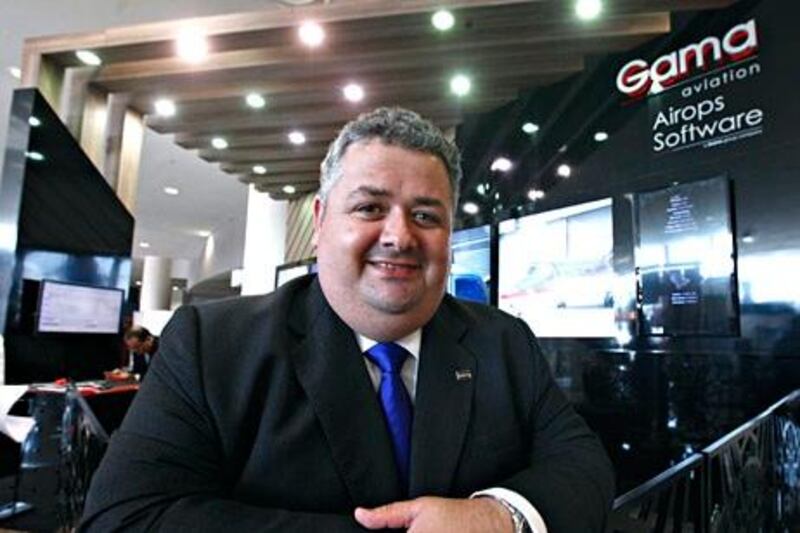When Dave Edwards, the regional managing director for the Middle East and Asia at Gama Aviation, got the weekly figures and saw a time of three minutes from when a corporate jet landed at Sharjah International Airport to when the passengers were on their way, he thought there had been a typo.
"It set a new benchmark," he says. "We had everything there [and] everything went in our favour. The plane landed in the right direction, it taxied [to the stand], the door opened … customs security, immigration stuff was done and three minutes later they got into the car and were driving away."
The average landing-to-terminal time at Gama's base at Sharjah is six minutes. In corporate aviation, speed is everything so this swift processing time helps explain why Mr Edwards was particularly upbeat during the Middle East Business Aviation (Meba) show in Dubai last week: 2012 has been a good year for Gama.
Since the company opened its base at Sharjah to service executive jets in February, the company has attracted business not only from aircraft stopping to refuel on their way to Asia, but also, increasingly, from people using the airport as its final destination.
"Everyone's asking, Why Sharjah?' but it's a great location," Mr Edwards says.
While Dubai International Airport is a very popular location in the UAE for executive jets, it is also sometimes difficult to get a landing slot, and the average landing-to-terminal time is longer.
"People always forget against the amazing publicity that Dubai always seems to get [that] Sharjah is a huge economic heartland of its own," Mr Edwards explains. "There are a number of business jet operators who use the airport and a number of people there who use business jets. With the federal investment in the road networks, it's 20 minutes from Dubai."
Business aviation provides time, and if passengers judge the service on what time they leave home and get to their meetings, then Sharjah is a "very good alternative for Dubai if not arguably as good because you don't have the taxi time that Dubai has. Here [in Dubai] or in Abu Dhabi, the touchdown is 15 to 20 minutes. Our passengers are already 12 minutes down the road."
Of course, the competition will hot up when business jet operations start running at Dubai's new Al Maktoum International Airport next year.
As well as opening its base this year, Gama also announced at the Meba show that it is adding five aircraft to its Middle East fleet, bringing the total to eight. The company also announced that for the first time it will base a plane in Abu Dhabi and is looking for "other opportunities" in the capital.
By Mr Edwards' own admission, this is a fairly rapid expansion. But is it justified?
"It's definitely been an odd few years," he admits.
"The global recession that hurt everyone … the Arab Spring and the problems in Syria. In general, it's coming back. Dubai is really popular again, the aircraft coming into the region are here. In 2008, the increase was 30, 40 per cent a year.
"Now it's 1 or 2 per cent so it's a much more normal market. But people do forget that the UAE and the Middle East and North Africa business jet market is so young: 25 years ago there were hardly any business jets; 10 years ago, there was probably about 10 per cent of the fleet that we have now and the growth in the past 10 years has been huge. Statistically it will be bit confused by the fact [the Middle East] is playing catch up."
Gama's next move is into Saudi Arabia, where it opened a base in May. The company also has a presence in Hong Kong.
"That's been slower," he says. "But it will give us a springboard to get into the Chinese market. I don't think it's any secret: most of us want to be in the Chinese market."





